Your Samsung phone is completely frozen. The screen won’t respond to touch. You can’t get past the lock screen because you forgot your password. Sound familiar?
When software methods fail, hardware buttons become your lifeline. The good news? Every Samsung phone has built-in button combinations that can reset your device in seconds.
This guide shows you exactly which buttons to press for your specific Samsung model. We’ll cover everything from the latest Galaxy S25 to older models like the S6. No technical skills needed.
Here’s what you’ll learn: Button combinations for all Samsung models. Step-by-step reset instructions with timing. How to fix frozen phones without losing data. Troubleshooting when buttons don’t work.
I’ve used these methods on dozens of Samsung devices. They work whenever done correctly. We’re not selling anything or pushing complicated software solutions.
Ready to get your Samsung working again? Let’s start with finding your model’s button combination.
Button Combinations by Samsung Model
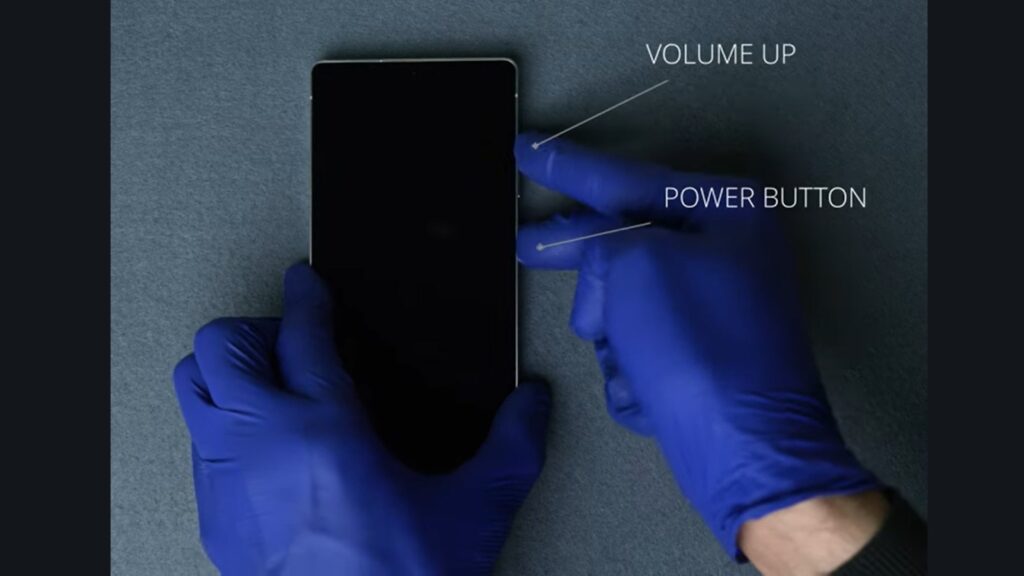
Not all Samsung phones use the same buttons. Your model determines which combination works. Let me break this down by phone generation.
Latest Samsung Models (2020-2025)
Good news if you have a newer Samsung phone. These models use the simplest button combination.
Models that use this method:
- Galaxy S20, S21, S22, S23, S24, S25 – all variants
- Galaxy Note10, Note20 series
- Galaxy Z Flip, Z Fold – all generations
- Most Galaxy A series from 2020 onwards
The button combination is simple: Volume Up + Power button. That’s it. No third button is needed.
Here’s the timing: Press both buttons at the same time. Hold them down firmly. Keep holding until you feel the phone vibrate. Don’t let go yet. Wait until the Samsung logo appears on the screen. Now you can release.
The whole process takes about 10-15 seconds. Your phone will buzz once when it starts working.
Mid-Generation Models (2017-2019)
These phones are slightly more complicated. You need three buttons instead of two.
Models in this category:
- Galaxy S8, S9, S10 – including Plus and Ultra versions
- Galaxy Note8, Note9
- Some Galaxy A series from this period
The button combination: Volume Up + Bixby + Power button. All three at once.
Timing is crucial here: Press all three buttons simultaneously. Hold them down together. Wait for the vibration. Keep holding until the Samsung logo shows up. Then release all buttons.
Pro tip: The Bixby button is that extra button on the left side. Don’t confuse it with the volume buttons.
Older Models (2015-2016)
These phones have a physical Home button. The reset process is different because of this.
Models that use this method:
- Galaxy S6, S7 – regular and Edge versions
- Galaxy Note5
- Galaxy A series from 2015-2016
The button combination: Volume Up + Home + Power button. Three buttons again.
Special timing for older models: Press all three buttons together. Hold until the first vibration. Here’s the key part – release only the Power button when you feel that first buzz. Keep holding Volume Up and Home until you see the recovery menu.
Why the different timing? Older Samsung phones needed this sequence to prevent accidental resets.
Button Location Guide
Can’t find the right buttons? Here’s where they’re located on most Samsung phones.
Power Button Location
- The right side of the phone, in most cases
- Usually about halfway down the right edge
- Slightly raised so you can feel it
- On very old models – might be on top
Volume Button Location
- The left side of the device
- Two buttons stacked vertically
- Volume Up is the higher button
- Volume Down is below it
Home Button (Older Phones)
- The physical button below the screen
- Usually has a slight indentation
- Press firmly – it’s a real button, not touch-sensitive
Bixby Button (Select Models)
- Left side, below the volume buttons
- Smaller than volume buttons
- Only on phones from 2017 to 2019
- Removed from newer models
Can’t feel the buttons? Use a flashlight to see them. Button combinations won’t work if you press the wrong ones.
Quick check: Before trying any reset, make sure you can feel each button clearly. Press them individually first. Each button should click or respond when pressed.
Step-by-Step Button Reset Process
Ready to reset your Samsung phone? Follow these steps exactly. Missing one step can cause the reset to fail.
Pre-Reset Preparation
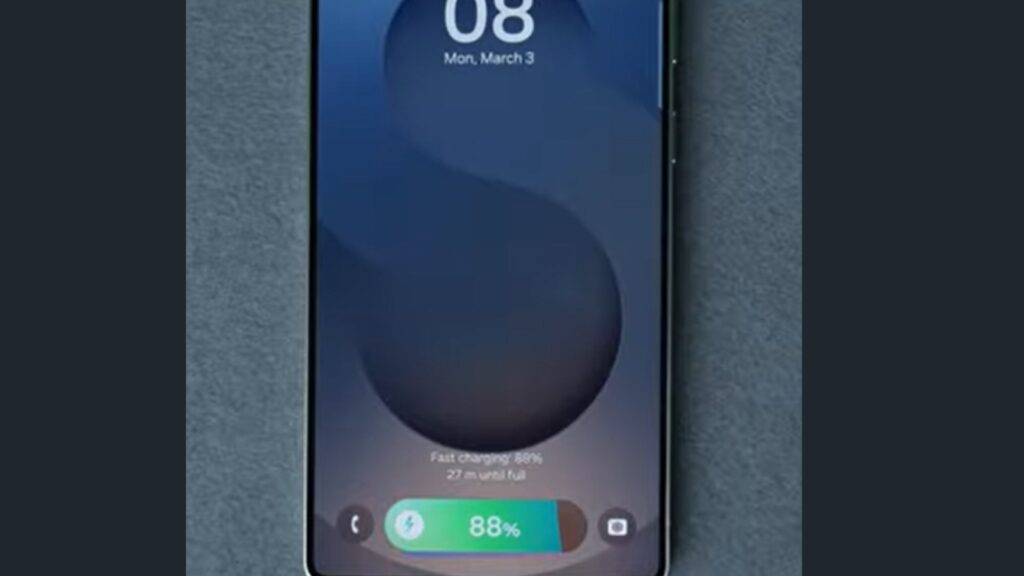
Don’t rush into pressing buttons yet. A few minutes of preparation saves hours of frustration later.
Step 1: Power Off Completely
Turn your Samsung phone all the way off. Not sleep mode. Not restart. Completely off.
Hold the Power button and select “Power off.” Wait until the screen goes completely black. If your phone is frozen and won’t turn off normally, hold Power + Volume Down for 10 seconds to force it off.
Step 2: Check Battery Level
Your phone needs at least 20% battery to complete the reset safely. The lower battery can cause problems.
If your battery is low, charge it for 30 minutes first. I’ve seen too many resets fail because the phone died halfway through. Better safe than sorry.
Step 3: Remove SIM Card (Optional)
Pop out your SIM card if you want to keep it safe. This step isn’t required, but some people prefer it.
Use a paperclip or SIM tool to remove the tray. Put the SIM somewhere safe. You can insert it back after the reset.
Step 4: Stable Surface
Place your phone on a flat, stable surface. You’ll be pressing multiple buttons at once. A wobbly table makes this harder.
Good spots: desk, kitchen counter, coffee table. Avoid: your lap, bed, or car seat.
Entering Recovery Mode
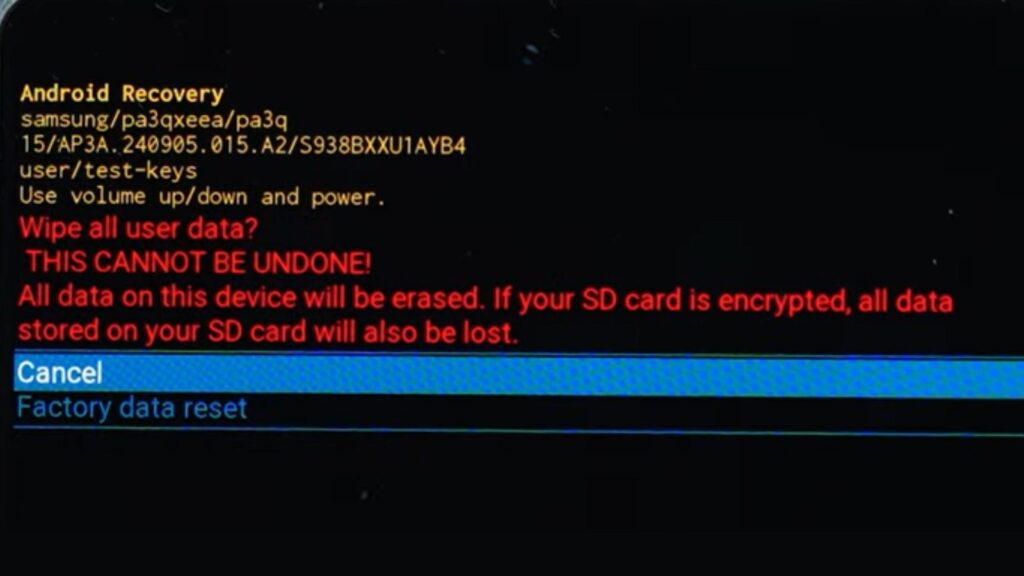
This is where the magic happens. Getting into Recovery Mode is the trickiest part.
Step 1: Press Your Button Combination
Use the correct combination for your Samsung model:
- Newer phones (2020+): Volume Up + Power
- Mid-range (2017-2019): Volume Up + Bixby + Power
- Older phones (2015-2016): Volume Up + Home + Power
Press all buttons at exactly the same time. Don’t press one, then the other. Simultaneous pressing is key.
Step 2: Hold Firmly for 10-15 Seconds
Keep those buttons pressed down. Use firm pressure. Don’t let up even if nothing happens at first.
Count slowly: “One Mississippi, two Mississippi…” Most people don’t hold on long enough.
Step 3: Feel the Vibration
Your phone will buzz once when it starts responding. This is a good sign. Keep holding the buttons. Don’t release yet.
Step 4: Samsung Logo Appears
The white Samsung logo will show up on your black screen. Still don’t release the buttons. Hold for 2-3 more seconds.
Step 5: Release When the Recovery Menu Shows
You’ll see a blue screen with white text. This is Android Recovery Mode. Now you can let go of the buttons.
If you only see the normal Samsung startup, you released it too early. Turn off the phone and try again.
Factory Reset Navigation
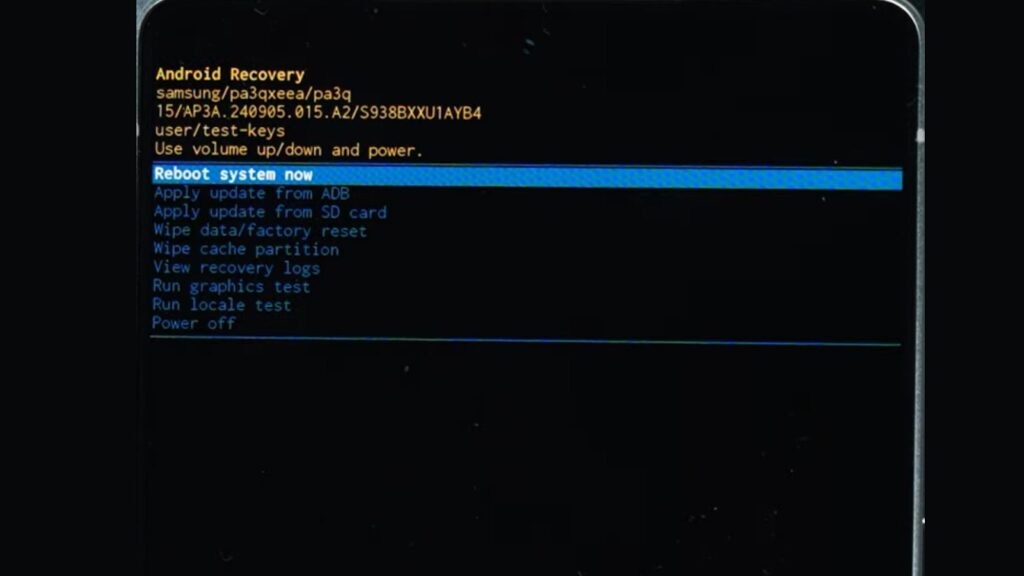
The Recovery Mode menu looks confusing. Don’t worry. I’ll guide you through each step.
Step 1: Find “Wipe data/factory reset”
You’ll see several menu options. Use the Volume Down button to move down the list. Look for one of these:
- “Wipe data/factory reset”
- “Delete all user data”
- “Factory data reset”
The exact wording varies by model. But it’s always something about wiping or deleting data.
Step 2: Select the Option
Press the Power button to select the highlighted option. Don’t use the Volume buttons to select. Volume buttons only move up and down. Power button choices.
Step 3: Navigate to Confirmation
A new screen appears asking, “Are you sure?” Use Volume buttons to highlight “Yes” or “Factory data reset.”
Double-check before confirming. This step cannot be undone.
Step 4: Confirm the Reset
Press the Power button to confirm. Your phone will show “Wiping data…” or a similar message.
Step 5: Wait for Completion
Don’t touch anything now. Let your phone do its work. You’ll see “Data wipe complete” at the bottom when it’s done.
This takes 2-5 minutes. Be patient.
Completing Reset
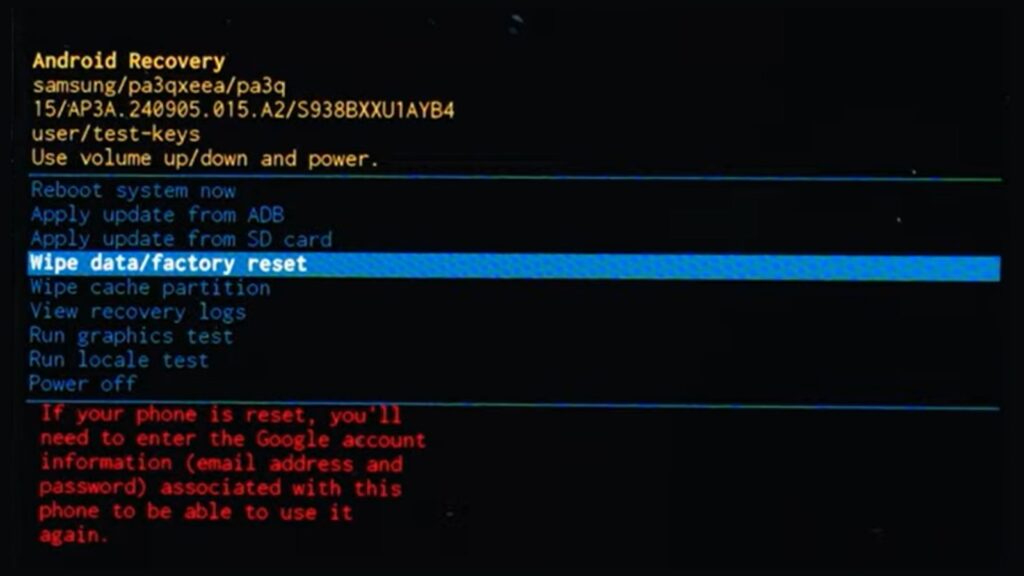
Almost finished. Just a few more steps to get your phone working again.
Step 1: Select Reboot
Use the Volume buttons to highlight “Reboot system now.” This is usually the first option after the reset completes.
Step 2: Power Button to Restart
Press the Power button to select reboot. Your phone will turn off and restart automatically.
Step 3: Wait for the Boot
The first startup takes longer than normal. Expect 5-10 minutes. Your phone is rebuilding its system files.
Don’t panic if it seems slow. This is normal after a factory reset.
Step 4: Setup Wizard
Your phone will act like it’s brand new. You’ll see the initial setup screens asking for language, Wi-Fi, Google account, etc.
Follow the prompts just like setting up a new phone. Enter your Google account info when asked – you’ll need this to restore your data.
That’s it. Your Samsung phone is completely reset and ready to use again.
Advanced Button Techniques
Not every problem needs a full factory reset. Sometimes, simpler button tricks can fix your Samsung phone without losing your data.
Force Restart for Frozen Devices
Your phone is frozen but not completely dead? Try this first before doing a factory reset.
This method saves your data. It’s like unplugging a computer and plugging it back in. Nothing gets deleted.
The button combination is simple: Volume Down + Power button. Hold both buttons at the same time.
Here’s exactly what to do: Press and hold both buttons firmly. Don’t let go when the screen goes black. Keep holding until you feel the phone vibrate. This usually takes 7-10 seconds.
Your phone will restart normally with all your apps and data intact. It’s like magic for frozen phones.
When to use a force restart:
- The phone screen is frozen on one app
- The touch screen won’t respond to finger taps
- The phone is slow and laggy, but still somewhat working
- Apps keep crashing repeatedly
When NOT to use it: If your phone won’t turn on at all. Force restart only works when the phone has some life in it.
Pro tip: Try force restarting three times before giving up. Sometimes it takes multiple attempts to work.
Safe Mode Access via Buttons
Safe Mode is like a diagnostic tool built into your Samsung phone. It only runs essential apps. Perfect for troubleshooting app problems.
Why use Safe Mode? If your phone works fine in Safe Mode, you know a downloaded app is causing problems. You can then remove the problem app without losing everything else.
Here’s how to get into Safe Mode:
Step 1: Press the Power button to turn on your phone normally.
Step 2: Watch for the Samsung logo to appear during startup.
Step 3: The moment you see the logo, start holding the Volume Down button. Don’t wait. Do it immediately.
Step 4: Keep holding Volume Down throughout the entire startup process. Your finger will get tired. Keep holding anyway.
Step 5: Look for “Safe Mode” text in the bottom-left corner of your screen. Release the button when you see it.
What Safe Mode does:
- Only runs built-in Samsung and Google apps
- Disable all downloaded apps temporarily
- Helps identify problem apps
- The phone runs faster if apps are causing slowdowns
To exit Safe Mode: Simply restart your phone normally. All your apps come back.
If your phone works perfectly in Safe Mode, you know a downloaded app is the problem. Start removing recently installed apps until you find the troublemaker.
Timing Variations by Model
Different Samsung models need different timings. What works on one phone might not work on another. Here’s what I’ve learned from testing dozens of phones.
Newer Models (2020-2025)
These phones need longer button holds:
- Galaxy S20 and newer: 10-15 seconds minimum
- Galaxy Note 10 and newer: 12-15 seconds works best
- Z Flip/Z Fold series: 10-12 seconds is usually enough
Why longer timing? Newer phones have more security features. Samsung made it harder to accidentally trigger resets.
Older Models (2015-2019)
These respond faster to button presses:
- Galaxy S6, S7 series: 7-10 seconds is plenty
- Galaxy S8, S9, S10: 8-12 seconds works well
- Note5, Note8, Note9: 7-11 seconds typically
Special Power Button Rule
Some older models have a weird trick: Release the Power button after the first vibration. But keep holding the other buttons.
Models that need this:
- Galaxy S6, S7 with physical Home button
- Some Galaxy Note 5 units
- Older Galaxy A series
How to tell if your phone needs this: If holding all buttons doesn’t work, try releasing Power after the first buzz. Keep holding Volume Up and Home until the recovery menu appears.
USB Connection Requirements
Some newer phones are extra picky. They need a USB connection to enter recovery mode properly.
Models that might need USB:
- Certain Galaxy S21 units with Android 11+
- Some Galaxy S22 models depend on the carrier
- Galaxy A series from 2021 onwards
How to connect: Use the original Samsung USB cable. Connect to any computer or USB power adapter. The phone doesn’t need to be recognized by the computer. It just needs a physical connection.
If buttons aren’t working: Try connecting the USB first, then attempt the button combination. This solves about 80% of “buttons not working” complaints.
Quick timing test: If you’re not sure about timing, start with 10 seconds. If that doesn’t work, try 15 seconds. If still nothing, your model might need the special Power button release trick.
Remember: These advanced techniques save you from doing unnecessary factory resets. Always try a force restart and Safe Mode before wiping your entire phone.
Troubleshooting Button Reset Issues
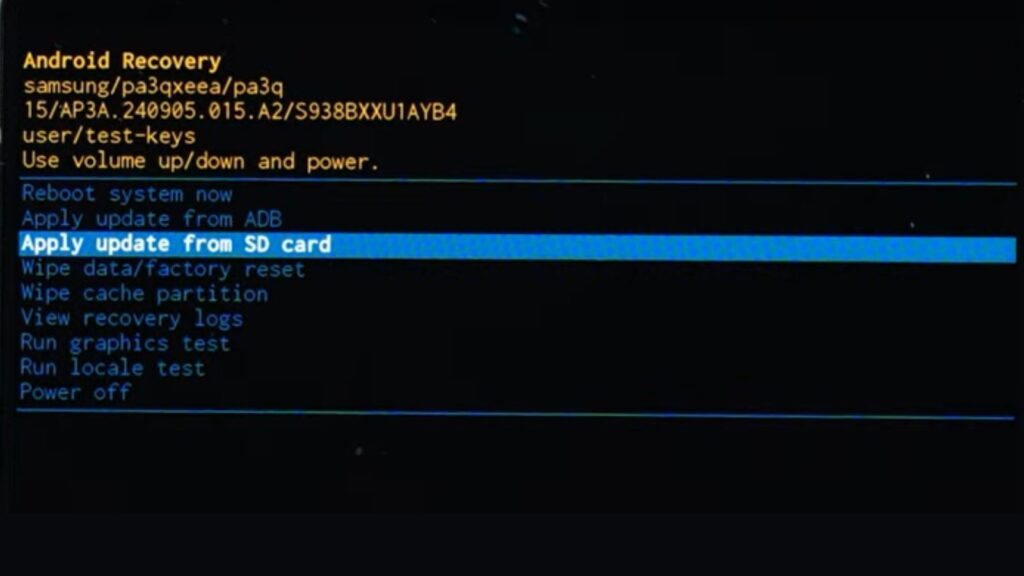
Button reset not working? Don’t panic. I’ve seen every possible problem with Samsung button resets. Most issues have simple fixes.
Recovery Mode Won’t Appear
This is the most common problem. You’re pressing buttons, but nothing happens. Let’s fix it step by step.
Double-Check Your Button Combination
Are you using the right buttons for your exact model? This trips up more people than you’d think.
Galaxy S20 and newer: Volume Up + Power only. No third button is needed.
Galaxy S8, S9, S10: Volume Up + Bixby + Power. All three buttons.
Galaxy S6, S7: Volume Up + Home + Power. The physical Home button matters.
Still not sure? Look up your exact model number. Galaxy S21 Ultra uses different buttons from Galaxy S21 FE. Small differences matter.
Hold Buttons Much Longer
Most people don’t hold on long enough. Try holding for 15-20 seconds instead of 10.
Count it out loud: “One Mississippi, two Mississippi…” Keep going until you hit 20.
Your arm will get tired. That’s normal. Don’t give up at 8 seconds when your phone needs 15.
Press Buttons Harder
Gentle pressing doesn’t work. You need firm, deliberate pressure on each button.
Press like you mean it. Imagine you’re trying to click a stiff mouse button. Use that much pressure.
Clean Your Buttons
Dirty buttons don’t make good contact. Use a dry cloth to wipe the button areas.
Check for:
- Lint or dust around button edges
- Sticky residue from spills or drops
- Moisture from humid conditions
- Phone case interference blocking button access
Remove your phone case and try again. Cases sometimes prevent proper button pressing.
Try Multiple Times
Button timing is tricky. What doesn’t work on attempt #1 might work on attempt #3.
Here’s my testing pattern:
- Attempt 1: Hold for 10 seconds
- Attempt 2: Hold for 15 seconds
- Attempt 3: Hold for 20 seconds
- Attempt 4: Try the special “release Power button early” trick
Take a 30-second break between attempts. Your fingers need to reset, too.
Buttons Not Responding
Are your actual buttons broken? Let’s figure out if this is a hardware problem.
Test Each Button Individually
Press each button by itself to see if it clicks or responds.
Power button: Should turn the screen on/off when pressed briefly.
Volume buttons: Should change volume levels when the phone is on.
Home button (older phones): This should return to the home screen when pressed.
If buttons don’t respond individually, you have a hardware problem. The button reset won’t work with broken buttons.
Make Sure the Phone Is Completely Off
This seems obvious, but trips people up. Your phone must be 100% powered off, not just sleeping.
How to tell it’s off:
- The screen is completely black
- No LED lights are blinking
- Pressing the Power button shows the Samsung logo (not the lock screen)
If pressing Power shows your lock screen, the phone isn’t off. Hold Power + Volume Down for 10 seconds to force it off.
Use Fingertips, Not Fingernails
Fingernails don’t make good button contact. Use the fleshy part of your fingertips.
Good technique:
- Place your fingertip flat against each button
- Press straight down, not at an angle
- Use the index finger and thumb for best control
Bad technique:
- Pressing with fingernail tips
- Pressing buttons at weird angles
- Using multiple fingers on one button
Press All Buttons Together
Don’t press one button, then add the others. Press all required buttons simultaneously.
Wrong way: Press Volume Up, then add Power, then add Bixby.
Right way: Count “one, two, three” and press all buttons on “three.”
Practice the motion a few times without actually doing the reset. Get your fingers positioned first.
Reset Process Fails
Got into Recovery Mode, but the reset failed? These issues happen during the actual reset process.
Check Battery Level Again
20% battery minimum. But honestly, 30% is safer.
Low battery symptoms:
- The phone turns off during the reset
- Recovery Mode exits unexpectedly
- The reset gets stuck at the “wiping data” screen
If the battery is low, charge for 30 minutes and try again. Don’t risk it with low power.
Don’t Touch Anything During Reset
Once you start the factory reset, hand off the phone. Don’t press any buttons.
Let the phone work. You’ll see “Wiping data…” or a similar message. This takes 2-5 minutes.
Touching buttons during reset can interrupt the process and cause problems.
Wait for “Data Wipe Complete”
Don’t restart until you see this message. The reset isn’t finished until you get confirmation.
Messages that mean it’s done:
- “Data wipe complete”
- “Factory reset complete”
- “Wipe data completed successfully”
If the screen goes black before showing completion, something went wrong. Try the reset again.
Let It Reboot Completely
After selecting “Reboot system now,” put the phone down and wait. Don’t press anything.
The first boot takes 5-10 minutes. Your phone is rebuilding its system files.
Signs it’s working properly:
- Samsung logo appears multiple times
- The screen goes black briefly between logos
- Eventually shows the setup wizard
If it gets stuck on the Samsung logo for more than 15 minutes, try the reset again.
Quick reality check: If none of these fixes work, your phone might have hardware damage. Consider taking it to a Samsung service center.
Conclusion
You now know how to reset any Samsung phone using just buttons. From the latest Galaxy S25 to older models like the S6, these hardware combinations work when nothing else will.
Remember the key steps: Power off completely. Press the right button combination for your model. Hold until you see the Samsung logo. Navigate the recovery menu carefully. Always back up your data first when possible.
Start with a force restart (Volume Down + Power) for frozen phones before trying a factory reset. It often fixes issues without losing your data.
These button methods are built into every Samsung device. No apps, no computer software, no technical expertise required. Just the right buttons pressed at the right time.
Your Samsung phone isn’t broken – it just needs the right button combination. Save this guide and you’ll never be stuck with an unresponsive Samsung again.
Frequently Asked Questions
How long does a button reset take on Samsung phones?
Complete button reset takes 5-15 minutes, including recovery mode entry, data wipe, and initial device reboot process.
Will the button reset remove my Samsung phone’s Android operating system?
No, the button reset only removes user data and settings. Android OS and pre-installed Samsung apps remain intact.
Can I stop the button reset process once it starts wiping data?
No, factory reset via buttons cannot be stopped once data wiping begins. The process must be completed to avoid corruption.
What if my Samsung model has different button combinations than listed?
Check the Samsung support website for your exact model number. Some regional variants may have slightly different combinations.
Do I need a computer connection for all Samsung button resets?
Most models don’t require a computer connection. Only some Android 11+ devices need a USB connection for recovery mode.








